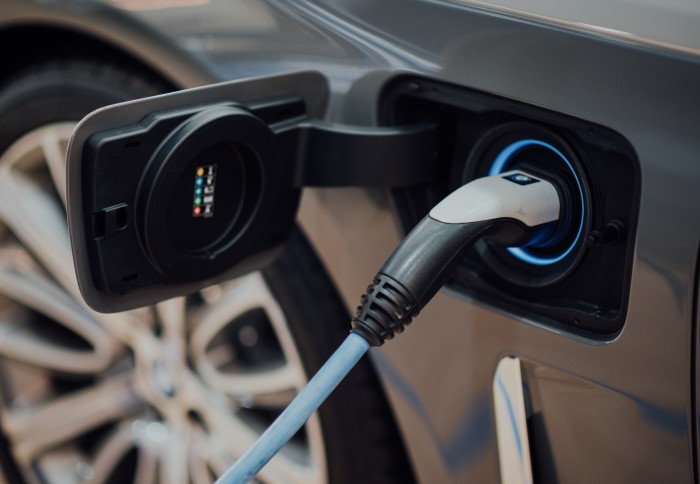£1.6 million funding to accelerate alternative fuel and batteries research
by Sara West

The three-year project will significantly accelerate the discovery and optimisation of sustainable, high-performance batteries and electro-fuels.
The Engineering and Physical Sciences Research Council (EPSRC) has provided £1.6 million in funding to accelerate the discovery and development of novel sustainable batteries and electrodes for sustainable e-fuels.
“This is an immensely exciting project to be leading; we have a very short time to get to net zero, and this means we need to accelerate research in sustainable energy materials and devices.” Professor Magda Titirici Department of Chemical Engineering
The project, known as DIGIBAT, will be led by Professor Magda Titirici in the Department of Chemical Engineering and will be a cross-College collaboration between Imperial College London, industrial partners and national and international higher education institutions.
This project will feature several state-of-the-art automated multi-user platforms able to synthesise a variety of battery electrodes and electrocatalysts at high volume. These multi-user platforms are the first of their kind worldwide and will bridge materials discovery to device manufacturing, contributing to the UK’s productivity and net zero goals by accelerating new discoveries for the energy storage and sustainable fuels of the future.
Robotic material synthesis and battery assembly
DIGIBAT will combine theory-led high throughput experimentation, where a large number of experiments are carried out in parallel, with data science and machine learning. One of the key features of the project is the use of robotic automation technology, which can synthesise 100 new materials and formulations a day and assemble 100 battery cells per day in either a pouch or a coin configuration. By comparison, a human researcher can currently synthesise a maximum of 4 new materials and assemble-test around 4–6-coin cells per day. As well as increasing productivity, the use of robots will provide the added advantage of eliminating unavoidable human errors and increasing safety.
Principle Investigator Professor Magda Titirici said: “This is an immensely exciting project to be leading; we have a very short time to get to net zero, and this means we need to accelerate research in sustainable energy materials and devices.”
Accelerating material and chemical discovery
The project will have three core streams of work: materials synthesis and characterisation, electrode and device manufacturing, and electrochemical testing for both batteries and electrocatalysts. The discovery of new materials will be coupled with in situ characterisation and a fully automated manufacturing loop from slurry formulations (precise dispensing of solids and liquids), cell manufacturing (controlled coating), cell assembly (coin or pouch), and electrochemical testing.
“Ultimately DIGITBAT will bridge the gap between materials discovery and electrochemical testing, and device fabrication significantly adding to our knowledge and progress in energy materials and devices." Professor Mary Ryan Vice Provost (Research and Enterprise) and Co-investigator on the grant
In addition to the characterisation and testing, researchers will eliminate one of the biggest challenges in energy storage and conversion research, the lack of standardised and reproducible data. By allowing robots to perform delicate and multistep operations, this will free up human time for the understanding of fundamental electrochemical concepts and to develop machine learning algorithms for optimising materials and processes.
DIGIBAT will enable an entirely new electrochemical progress strategy, by allowing inverse design and tailoring of materials, electrodes, processes, and cells. It will leverage fundamental insights from battery science to enable battery-like devices to enable decentralised production of sustainable fuels from nitrogen or atmospheric pollutants including carbon dioxide.
Professor Mary Ryan, Vice Provost (Research and Enterprise) and Co-investigator on the grant said “This project places Imperial at the centre of new materials and chemicals discovery paradigm. Along with ATLAS and ROAR we now have the tools to shape the way we develop chemicals, materials and devices. At the heart of the project is bringing together an interdisciplinary team bridging theory, experiment and data science to accelerate the energy transition. We look forward to working in partnership with colleagues from across the UK as part of this new investment.
“Ultimately DIGITBAT will bridge the gap between materials discovery and electrochemical testing, and device fabrication significantly adding to our knowledge and progress in energy materials and devices. This will enable us to provide a clear pathway to the sustainable and high-efficiency batteries of the future.”
Co-Investigator Professor Aron Walsh added: “I am excited by the close connection between modelling and measurements. We have the opportunity to integrate the latest artificial intelligence techniques to make our research workflows faster and smarter.”
-
DIGIBAT is a collaboration between:
Dr Sam Cooper, Dyson School of Design Engineering
Dr Becky Greenaway, Department of Chemistry
Professor Greg Offer, Department of Mechanical Engineering
Professor Mary Ryan, Vice-Provost (Research and Enterprise) and Department of Materials
Professor Ifan Stephens, Department of Materials
Professor Magda Titirici, Department of Chemical Engineering
Professor Aron Walsh, Department of Materials
Project partners include bp, Deregallera Ltd., DiGiFab, Enserve Group, Faradion Limited, Imperial College London, Johnson Matthey, Ruhr University Bochum, Shell, Toyota and the University of Toronto.
The EPSRC reference is EP/W036517/1.
Image: Unsplash
Article text (excluding photos or graphics) © Imperial College London.
Photos and graphics subject to third party copyright used with permission or © Imperial College London.
Reporter
Sara West
Communications Division